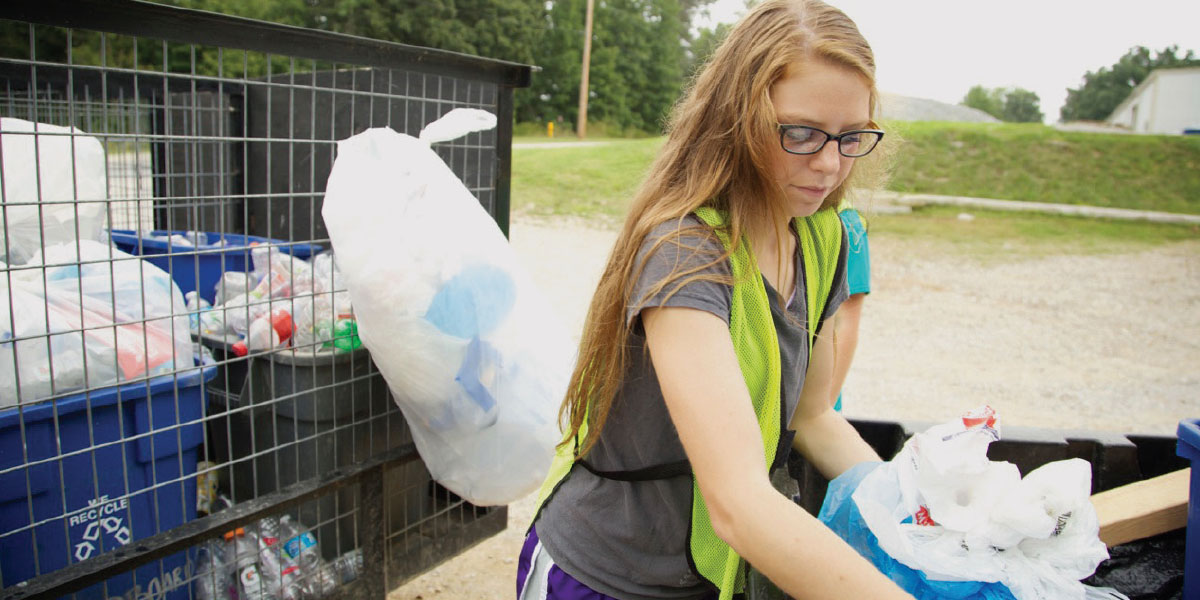As the result of an effort to reduce costs without decreasing academic quality or student accessibility, John Brown University in July 2012 became the first university in Arkansas to reach zero-landfill status. Absolutely no trash from JBU ends up in a landfill. To accomplish this, the institution, located in Siloam Springs, examined long-standing procedures with an eye toward sustainability.
The process led to discussion of some innovative ideas, the implementation of which eventually led to NACUBO honoring the university with a 2014 Innovation Award. Previously highlighted in Business Officer (November 2013), the initiative continues to accomplish its goals; here are some additional details and updates.
Waste Not
A thorough review of waste management practices pointed JBU to landfill alternatives. With the following methods, the university recycles just about everything.
- Leftovers are consumed—by wild animals. For the first year, a local hog farm was the beneficiary of student’s half-eaten lunches. Now, a drive-through safari gets any remains of the day, estimated to be 300 gallons of food weekly.
“North of town is a drive-through safari with lions, tigers, kangaroos, buffalo, and oxen,” explains Steve Brankle, director of facilities and sustainability. “The staff comes to get all the food scraps from the kids’ plates. They also take any food in the freezers or refrigerators that is out-of-date—produce, breads, meats.”
- Dumpsters have disappeared. Two Cram-a-Lots, large compactors so-named because you can stuff and squeeze a lot of trash into them, have replaced unsightly dumpsters once scattered across the campus. Instead of spending $50,000 annually for dumpster service, JBU now gladly pays $13,000 to haul off compacted trash, which is converted into electricity through pollution-free emission incineration.

- Cooking oil powers mowers. Students enrolled in a renewable energy class convert the kitchen’s used cooking oil into biodiesel fuel. “Diesel runs about $4 a gallon, and we can produce it for about $2 a gallon,” Brankle says. “When a lawn mower goes by and it smells like a French fry, you know it’s running on biodiesel. We generate up to 300 gallons a semester. The waste no longer leaves the campus; it’s an education for the students; and we use it in our backhoes, mowers, and tractors.”
- Daily emptying of individual trash cans falls by the wayside. To provide an incentive to recycle, the custodial staff picks up only recyclables at deskside. Everyone, from executives on down, must empty his or her own trash can at a central building location.
Custodial staff handles sorting. “We currently recycle No. 1and No. 2 plastic,” Brankle reports. “Other categories are more difficult to dispose of, since companies can’t easily use them for financial advantage. We also recycle paper, cardboard, all colors and types of glass, plastic bags, batteries, aerosol cans, and much more. And, so far, we’ve sold $53,000 worth of metal.”
Partners Make It Possible
Two factors—education and collaboration—have proven pivotal to the success of the program, which thus far has netted $74,000 for the university.
A broad-based communication campaign included meetings, e-mail messages, and newsletters designed to educate faculty, students, and staff on the benefits and methods of recycling. The campaign’s premise: Reasonable people will make reasonable sacrifices to recycle if they are provided with reasonable explanations and support.
The institution also reached out to a variety of partners. The Salvation Army provides recycling bins for students’ discarded items as move-out day approaches; Lowe’s takes used batteries; plastic bags go to Wal-Mart; AutoZone gets vehicle oil; the city of Siloam Springs receives paper, plastics, glass, and cardboard; and Esco, a local company, acquires all e-waste, such as computers.
The zero-landfill initiative has been a win-win: JBU has become a better steward of the environment and, in the process, has improved its financial sustainability.
SUBMITTED BY Kimberly M. Hadley, vice president of finance and administration, John Brown University, Siloam Springs, Ark.


